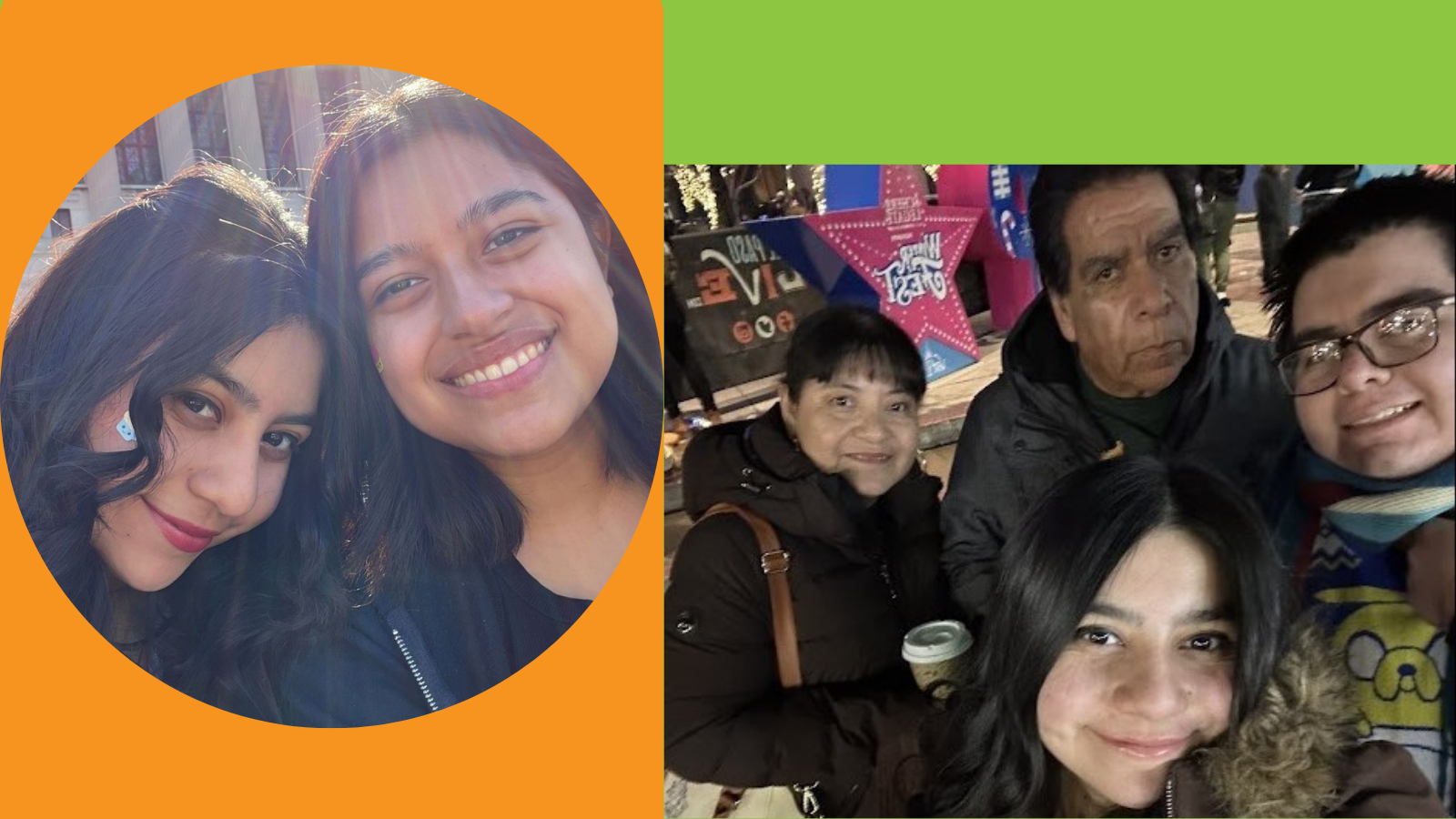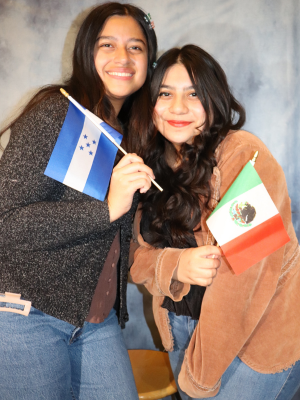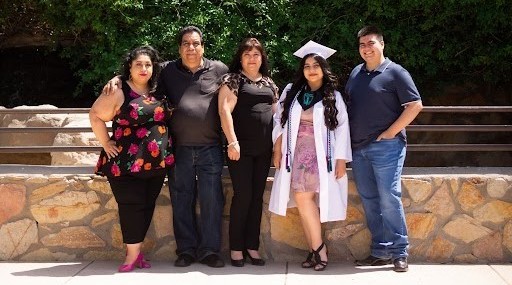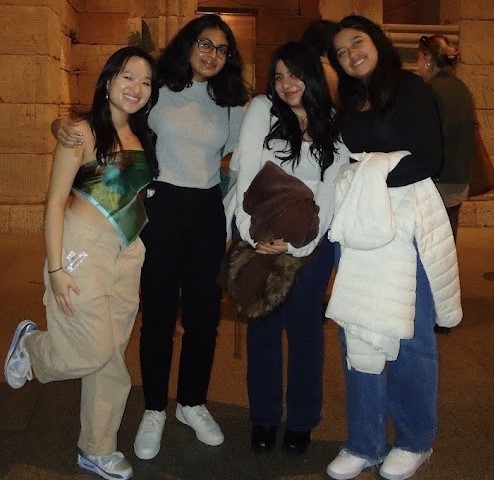Maggie Salinas on Finding Motivation and Community as a First-Gen Student
Maggie Salinas (CC’25) studies creative writing and works as a Communications Assistant at University Life. She shares her journey to Columbia as a first-generation, Mexican-American student, the mentors and friends she’s met here, and how her family keeps her focused and pushes her to persevere.

"Find your own people. Find a group of friends. It makes things so much easier... Just having someone in your presence is comforting, especially if you come from out of state or feel homesick."
This interview has been edited for clarity and style. Content warning: This article references racially motivated violence.
Could you tell me a little about your background and what drew you to Columbia?
I was drawn to Columbia because it was in New York. During high school, I wanted to do journalism, so I thought New York is where I needed to be. The other part was that [Columbia College] meets 100% of financial need and my state school would have ended up being more costly. I felt that if I was going to pick a school, I wanted one that felt more diverse. I had also heard a lot of great things about the writing program. Coming here was a big shift because I'm Mexican, so my parents were not very fond of the idea of me moving across the country. We're very family-oriented people.
Who are some of your mentors at Columbia?
Maria Hinojosa at Barnard. She's always giving you so much optimism. The class I have with her covers some heavy topics: Latinx identity, Immigration and Customs Enforcement (ICE), and prison reform. We've been watching documentaries and reading her previous work about the immigration system since Obama was in office and about recent shootings, like the one in El Paso. Reflecting on all those things through a Latinx lens and being taught by her is constantly reminding me that I can keep pursuing this career. It's validating to know that you're at this institution that didn't start out being for you, or for people like you, but there are these professors teaching here who are like you and are helping you grow.
There’s also Kat Raichlen, she was my LitHum professor. She let me write about Metamorphosis throughout the whole semester because I fell in love with Kafka. She helped me with a scholarship, too, and I admire her so much for that.

What parts of your upbringing and heritage are you most proud of and how do you want to share that with others?
Overall, it’s the sense of community I grew up with. I grew up with this idea that family means everything, and everything I do isn't just for me. I don't like the idea of just leaving others behind because you're not on your own.
I learned that from my dad. He is always thinking of others before himself. He had a really tough upbringing when he came to the United States. A lot of Mexicans are like that: bringing others up, working together, and not leaving someone behind.
How have those aspects of your identity intersected with your experiences here at Columbia?
It was really weird at first because it felt so intimidating here. Everyone was top of their class, and it can feel cutthroat. It's one of the reasons why I struggled to fit in a lot during my first year.
If I didn't have my roommate, Luisa, I don't think I could have stayed at Columbia. I don't like feeling so alone, especially growing up with a big family and a big community where everyone and everything is celebrated. Making myself be with people that I know could relate to me helped. Luisa and I actually met online during COVID, which is really funny. We already knew each other from the Bovard Scholars Program. She's not my roommate anymore, but I still refer to her as my roommate. We have single dorms now, but we’re right next to each other.
We have a lot in common. We both came from Latinx households. She was also one of the first in her family to go to college. We’re both across the country from our hometowns. She's from California. I'm from Texas. We’re both the youngest in our families. She listens to me and, in terms of personality, she's like the complete opposite of me. I can be very dramatic and in my feelings, and she's a little more analytical and logical. If I freak out about something, she’s always like, “Okay, here, let's figure it out.” She calms me down, and she lets me express myself. I love her for that because I don't feel like I need to hide myself or mask around her. I can just be myself. She is kind of like a sister to me, when I am so far away from my own family. Last night we wanted ice cream, and so we went to Haagen-Dazs. It’s little things like that where she is always there for me and I try to be there for her, too.
"It's validating to know that you're at this institution that didn't start out being for you, or for people like you, but there are these professors teaching here who are like you and are helping you grow."
Where have you found a community here at Columbia?
When I first started, I would attend some meetings, like with Chicanx Caucus, because I wanted to be around other Mexican-identifying students. I tend to go to a lot of Latinx events, and most of my friend group is Hispanic. Besides that, I joined The Daily Spectator because I was thinking of journalism as a career or something in that field. I've also done a few mentorship programs. Recently, I joined a dance group because my roommate is in it and I thought it would be great since I have a little more free time. I'm thinking of joining a folklórico group.
A lot of my friends are from the Bovard Scholars program. Some of them go here and Princeton, so we meet up a lot.
And what do you miss most about where you grew up?
Overall, what I miss most about home is constantly speaking in Spanish. I don't think I've ever spoken this much English before moving here. I grew up in a really rural area on the outskirts of El Paso and Juarez. Most of the people there are Mexican and speak Spanish. Everyone knows each other.
I was one of the first to even apply to an out of state private school. I don't think any one of us actually thought I would get in. I would tell one of the girls in the year below me things I was doing so she could be a year ahead on some of the things I missed out on because I wasn’t aware of them. She ended up getting into Harvard.
That just says a lot about how we grew up. We were all to some extent friends. And because we're predominantly Mexican, we would celebrate each other’s victories and go downtown to just hang out. So coming here, I really do miss that. I think I also outgrew a lot of people back home. I don’t know how to talk to them sometimes because we’ve had really different experiences since I left.

You mentioned not believing that you would get into Columbia. So why did you end up applying?
Because I was so stubborn is the best way to put it. I applied early decision, and it was an all or nothing situation. I didn’t want to go to any other private school. My counselors didn't know about Columbia. I had to figure it out all by myself. No one had applied here before, and there wasn't a lot of push toward it. It wasn't really mentioned.
How did your family react to your acceptance into Columbia?
I remember I went straight to my brother and told him. We had a little mini celebration then and there. Then I realized I had to tell my father: the very conservative, baby boomer, Mexican dad who‘s very protective and had a lot of struggles coming into the United States. He dealt with a lot of racism, so overall, his mindset has always been: “This country doesn't want me.”
He felt I shouldn't put myself in places where I'm not welcome because I'm pushing it by just being in this country. To him, everything was too good to be true. I was scared to tell him, so I didn't. I wasn’t going to tell him until I had to confirm in January. Then, my older sister, who’s very outspoken, bought me a Columbia hoodie for Christmas and didn't tell me what was in the gift bag. My dad questioned it, and he didn't talk to me for like three weeks because he was so sad. I knew he wasn't mad at me. He was just mad at the fact that he couldn't be happy for me because he was scared.
At one point he called me over to the living room and told me that I had to tell them no. In March, my sister helped me plan everything out: the flights, booking a hotel before we moved, and all that. Every time we brought up buying flights, my dad would get really quiet. He was in denial until moving day. I think part of him was hoping I changed my mind.
"I grew up with this idea that family means everything, and everything I do isn't just for me. I don't like the idea of just leaving others behind because you're not on your own."
He didn’t speak the whole seven-hours from El Paso to New York. I think it hit him when I moved in because he was finally talking and interacting. There was this guy outside, who was one of the orientation leaders helping us move in. He was offering advice to me as a first year, and he said: “Don't be scared about changes and be assertive.” Ever since then, my dad is constantly encouraging me to be assertive. So that's kind of endearing.
My brother and dad waited downstairs while my mom and sister helped me move in. When we finally finished, I went downstairs and started saying goodbye. My brother started crying like crazy, which is insane to me because I never see him cry. He still cries every time they drop me off at the airport. My mom was a mess and my sister too, but my dad kept his calm. My sister told me that he broke down the minute they got in the car, and he wouldn't stop crying, even when they got to the airport.
He’s finally made peace with it. And now, anytime I struggle or have a rough patch, he's always the first to remind me and say, “Ya vas a la mitad (You’re already halfway there).”

What has been your most memorable experience at Columbia so far?
I remember one time freshman year, the Chicanx Caucus was doing one of their annual quinceañeras for someone who didn't get to have one growing up. It was so wholesome to see. I grew up with quinceañeras every weekend. I grew up with a lot of general hangouts, partying, and loud music. When I came here, that wasn't the norm. Once I actually started integrating myself with other Latinx people, it was a total 180. That quinceañera was probably the first time I felt a little bit of home here at Columbia because the music was just like my parents’, and everyone was dressed like it was a real quinceañera back home.
Last year, there was the Día de Los Muertos event. I'm always going to remember it. It happened shortly after one of my friends passed away here. I usually always make a little shrine or altar for my great grandpa. That year, I included my friend, and I just kept thinking about it a lot because he was young. He was my age. What made me feel better was the fact that most of us Latinos had a picture of him, and he wasn’t even Latino. He was so sociable and learned how to speak Spanish and would talk with us. I thought that was really impressive. I remember when I went to his remembrance in Lerner, a lot of the people there were from his Spanish class. He had a lot of impact.
"And now, anytime I struggle or have a rough patch, [my dad's] always the first to remind me and say, 'Ya vas a la mitad' (You’re already halfway there).
What advice would you give to someone who was new to Columbia?
I would say to find your own people. Find a group of friends. It makes things so much easier. It doesn't have to be a big group. Even just one friend or two is so important to not feel alone and excluded. It makes it easier when things get tougher, especially with the academics and the rigor. Just having someone in your presence is comforting, especially if you come from out of state or feel homesick. I remember I was so homesick my first year, I wanted out every break.
Having people that I knew here made it worth coming back and made it feel like I could have a reliable community here.
And what are you looking forward to in the future?
I really look forward to graduating. I'm so nervous about not graduating on time or in general. In the back of my head, I'm thinking how no one in my family has made it to a private school. It's kind of scary. So yeah, I look forward to graduating and hopefully my parents seeing me graduate.
Want to share your story with us? Fill out this form or write to us at [email protected], if you'd like to connect with us about Student Voices.
